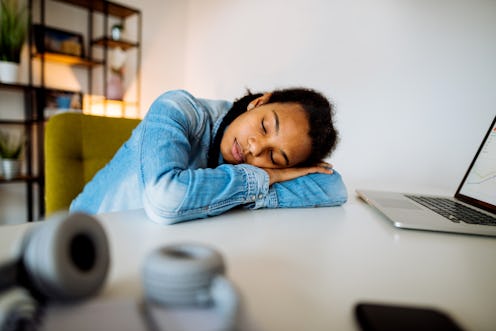Life
Signs You May Have Delayed Sleep Phase Syndrome

When I tell people that I'm not a morning person, it's basically the biggest understatement of the century. Although I'm currently lucky enough to have the flexibility to work during the afternoon and nighttime hours, my days in the corporate world were a different story. Back in the days when my alarm went off at 7:00 a.m. each morning, I blindly stumbled around my apartment in an exhausted daze, and was already dreaming of bedtime by the time I got on the subway to commute. Unfortunately, my plans to go to sleep early never exactly panned out — regardless of how tired I was, I'd toss and turn until around 3 a.m. I'm definitely not the only one who has experienced this miserable, vicious cycle —and contrary to what many people may think, it has nothing to do with lacking the self-control to go to bed at a decent hour. Rather, it may be something called Delayed Sleep Phase Syndrome. DSPS affects approximately 15 percent of the population and, for anyone who doesn't have a flexible schedule, it can lead to chronic exhaustion.
People with DSPS are naturally inclined to fall asleep between 2 a.m. and 6 a.m., and sleep until the late morning or early afternoon hours. Although it's a neurological disorder, not a psychological one, living with DSPS can sometimes lead to depression due to the effects of chronic sleep deprivation. Furthermore, the corporate world tends to operate on a 9-to-5 schedule, which means people with DSPS are frequently forced to function on as little as three hours of sleep. No matter how smart or capable a person is, the disorder can affect their ability to excel professionally and academically.
If any of this sounds painfully familiar to you, the first thing to do is visit a sleep specialist — there are a variety of sleep disorders, and many of them have similar symptoms, so seeing a professional is key in figuring out exactly what is going on. In order to diagnose DSPS, a doctor will typically ask you to keep "sleep logs" (particularly on nights when you can sleep on your natural schedule) and schedule a polysomnogram, which is an overnight sleep study. The polysomnogram monitors your brain waves, oxygen levels in the blood, heart rate, and body movements while you sleep, and doctors examine the results to reach a diagnosis. If your doctor orders a sleep study, I highly recommend bringing your own blanket — they're typically conducted in hospital units that, in my experience, are inexplicably freezing.
Once your doctor gets a handle on your diagnosis, they can suggest some treatment methods (though there is no guarantee that the treatment methods will work for you). For example, doctors can attempt to shift the body's circadian rhythm by prescribing bright light in the morning and restricting light exposure in the evening. There are, of course, no shortage of prescription sleep aids and these medications can definitely help people with DSPS fall asleep earlier, too. But, for me and many other people with the condition, the medication doesn't effectively reduce fatigue because the quality of our sleep is poor. Personally, I chose to take a low dose for a period of time because lying awake all night gave me severe anxiety — but I never woke up refreshed, even if I did get seven or eight hours of shut-eye. So know that if a recommended form of treatment isn't working for you or making you feel good, you can come back to your doctors and ask to go back to the drawing board.
People with DSPS are often unfairly (and infuriatingly) labeled as "lazy" because they struggle to stay alert and focused throughout the workday or school day. (Which, you know, isn't that surprising for a person who gets an average of three to four hours of sleep per night.) If all medical treatments fail and you find yourself drowning academically or professionally, it's important to know your rights — DSPS is a disability and the Americans with Disabilities Act requires that employers and schools provide reasonable accommodations. For example, you can work out a modified schedule with your employer that allows you to get more shut-eye and start your workday later, which means you can work during the hours when you're more alert and productive.
Not all schools and employers will be understanding, so your best asset is a supportive doctor who can effectively advocate for you in these situations. No one should be robbed of academic or professional opportunities due to a medical condition and, contrary to what some people seem to believe, DSPS is a very real illness. The good news is that it doesn't have to be debilitating — unlike those who suffer from insomnia, people with DSPS can sleep for eight hours and wake up refreshed — we just have different circadian rhythms that aren't compatible with "standard" schedules. Luckily, with the right medical team and lifestyle adjustments, we can ultimately be healthy, well-rested people.
Images: Getty Images (2); Giphy